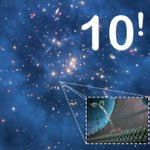- May 15, 2007: At the human scale (10^0), whales have been sighted in West Sacramento (SacBee article) -- that's probably not that great news for those whales...
- May 15, 2007: In other developments and at far greater scales, the Hubble space telescope has found a ring of dark matter. Check out Figure 14 of the paper that goes with these news: very neat! It shows 5 "mirror" images of the same galaxy -- the mirrors are due to an effect called 'gravitational lensing'. Figure 14 shows the "de-lensed" images: I find this quite convincing as it shows both that the original images were indeed "mirages" and that the scientists' model is "good" -- at least good enough to allow the de-lensing to work reasonably well!
- Earlier: Finally, the Inner Life of the Cell is a fantastic animation, giving a glimpse of exactly that (i.e., the inner life of a cell).
Po10
PS I like how 'powersoften' can be parsed in different ways: not just (1) Powers-of-10, but also (2) "powers often" and (3) "power soften" ... at this hour, my power (is) softening... OVER!

1 comment:
I noticed that the "Inner Life of a Cell" was used by ID folks to argue their "case". Well, certainly if you find a clock on the heath and get excited then I wouldn't be surprised that this animation gets you thinking... Someone pointed out to me that the animation makes things look much too "direct" and "smooth". As if a helicopter was going intensionally from A to B. Indeed, it's clear that the animation uses a bit of artistic license: The cell is certainly a spacious place if you live at the right power of ten. But it's not that "empty" (but this way, the visuals are so much less distracting... otherwise it would be hard to see the forest for the trees). However, I have to agree that showing more of the randomness and "jitter" in some of the smooth motions would have made the case for ID misuses of this much harder.. Maybe a link to some visualization of actual simulations (or actual observations!) would help set the record straight...
Post a Comment